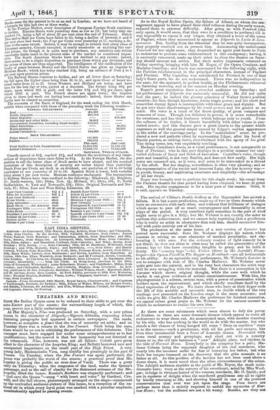THEATRES AND MUSIC- Boni the Italian Operas seem to be
reduced to their shifts to get over the ante-Easter part of the season; the extraordinary length of which, this year, proves not a little embarrassing.
At Her Majesty's, Nino was produced on Saturday, with a new prima donna in the character of Abigaele,—Signora Abbadia, respecting whom flattering paragraphs had appeared in certain newspapers. She made, however, so complete a fiasco that she was of necessity set aside; and on Tuesday there was a return to the Due Foscari. Such being the case, there would be no use in criticising the performance of this debutante. The manager must have engaged her under some misapprehension as to her qualifications; but the marvel is that her incapacity was not detected at the rehearsals. Nino, however, was not all failure: Coletti gave great effect to the character of the Assyrian King; and Belletti bestowed new and unexpected importance on the small part of the High Priest. A very Young lady, Mademoiselle Vera, sang timidly but pleasingly in the part of Fenena. On Tuesday, when the Due Foscari was again performed, the house was probably the worst of the season; a practical proof that Mr. Lumley is giving the public an over-dose of Verdi. There was a great rally on Thursday; when the magnates of the land, under the Queen's Patronage, and at the call of charity for the distressed artisans of the Me- tropolis, filled the boxes: Rossini's Barbiere was elegantly performed; and " God save the Queen "—sung " with heart and voice " by Gardoni, Cru- velli, and the full chores, picturesquely arranged on the stage—summoned up the unrivalled audience-picture of this house, to a reception of the na- tional air in which every loyal point was marked with a peculiar emphasis, unmistakeably applied to passing events. As to the Royal Italian Opera, the failure of Alboni, on whom the ma- nagement appear to have placed their chief reliance during the early season, reduced them to extreme difficulty. After going on with Tancrecli (the only opera, it would seem, that they were in a condition to perform) till it was impossible to repeat it any longer, they obtained a teuor of the name of Paglieri, whom they announced to appear as Edgardo in Lucia di Lam- mermoor. But, finding from the rehearsal that he was quite incompetent, they properly resolved not to present him. Announcing the unfortunate Tancredi for one night more, they despatched an agent post-haste to Paris to endeavour to procure some reinforcement in this emergency; having, it is currently rumoured, made up their mind to close the theatre on Satur- day should succour not arrive. But their active impresario returned on Friday morning, bringing with him M. Roger, of the Opera Comique, and Madame Castellan; and Lucia was announced for the following night, with the Parisian reinforcement in the principal characters, instead of Paglieri and Persiani. Why Castellan was substituted for Persiani in one of that lady's finest parts, we do not understand. There was no indisposition in the case; for she appeared, in perfect health, at the Philharmonic rehearsal on Saturday morning, and at the concert on Monday evening. Roger's great reputation drew a crowded audience on Saturday; and his performance of Edgardo was eminently successful. He did not quite look the part:, he lacked the gloomy grandeur of Walter Scott's poetical creation; his face, though handsome, wauts tragic power; and his short and somewhat dumpy figure is incompatible with ideal grace and dignity. But he got over these disadvantages by his vocal powers and his genius as an actor. His voice is a tenor of the finest quality, of great compass and evenness of tone. Though not deficient in power, it is more remarkable for sweetness, and has that freshness which belongs only to youth. From the softness of its timbre, it blends beautifully with other voices in con- certed music; and this feature gave a great charm to the quintet which expresses so well the general stupor caused by Edgar's sudden appearance in the midst of the marriage party. In the " malediction" scene, he pro- duced a new and pathetic effect by representing Edgar, after his burst of frantic passion, as sinking down, overwhelmed with the agony of his grief. The dying scene, too, was exquisitely touching.
Madame Castellan's Lucia, as a vocal performance, is not comparable to that of Persiani; who in this part displays in a peculiar manner her unri- valled richness of fancy and finish of execution. Castellan's voice, though pure and beautiful, is not very flexible, and does not flow easily. Her high notes are squeezed out, as it were, and seem to be attenuated to a thread by the effort. But her singing, nevertheless, is often very pleasing; and as the representative of the tender and innocent Lucy, she has in every way— in youth, beauty, and captivating sweetness and simplicity—the advantage of all her rivals.
Roger was brought over to perform for this single week; his congi1 from the Parisian theatre for that period having been obtained, we hear, at great cost. His regular engagement is for a later part of the season. Grisi, it is said, appears on Tuesday.


























 Previous page
Previous page